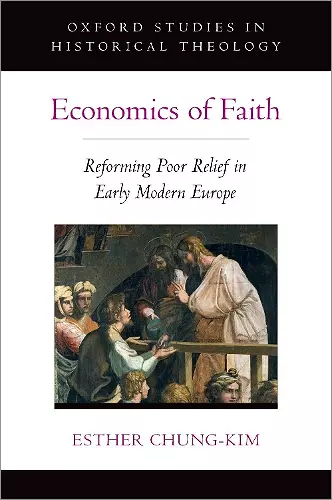Economics of Faith
Reforming Poverty in Early Modern Europe
Format:Hardback
Publisher:Oxford University Press Inc
Published:24th Sep '21
Currently unavailable, and unfortunately no date known when it will be back
This hardback is available in another edition too:
- Paperback£24.49(9780197751206)

Economics of Faith examines the role of religious leaders in the development of poor relief institutions in early modern Europe. As preachers, policy makers, advocates, and community leaders, these reformers offered a new interpretation of salvation and good works that provided the religious foundation for poor relief reform. Although poverty was once associated with the religious image of piety, reformers no longer saw it as a spiritual virtue. Rather they considered social welfare reform to be an integral part of religious reform and worked to modify existing poor relief institutions or to set up new ones. Population growth, economic crises, and migration in early modern Europe caused poverty and begging to be an ever-increasing concern, and religious leaders encouraged the development and expansion of poor relief institutions. This new cadre of reformers served as catalysts, organizers, stabilizers, and consolidators of strategies to alleviate poverty, the most glaring social problem of early modern society. Although different roles emerged from varying relationships and negotiations with local political authorities and city councils, reform-minded ministers and lay leaders shaped a variety of institutions to address the problem of poverty and to promote social and communal responsibility. As religious options multiplied within Christianity, one's understanding of community determined the boundaries, albeit contested and sometimes fluid, of responsible poor relief. This goal of communal care would be especially relevant for religious refugees who as foreigners and strangers became responsible for caring for their own group.
In Economics of Faith, Esther Chung-Kim examines the role of Protestant religious leaders in the development of poor relief reforms during the Reformation, particularly in Germany, the Swiss Territories, the Netherlands, and central Europe. New religious theologies and practices gave impetus to reconsiderations of traditional methods of poverty relief, particularly in cities, and provided new rationales for communal responsibility. * Elizabeth Tingle, De Montfort University, Leicester, Huguenot Society Journal *
This book provides a welcome synthesis across Protestant confessions and experiences. It is up to date on the scholarship, and readers will be left with a much broader understanding of the connections between religious values and social responses as implemented in real life in a variety of contexts. * Timothy Fehler, Scottish Journal of Theology *
In her wide-ranging Economics of Faith, Esther Chung-Kim explores the mutual influences of theology and local circumstances on poor relief and charitable policy in central Europe during the sixteenth century. Chung-Kim investigates the commonly asserted understanding that the medieval ideal of Christian charity lost its universal application to all poor in Protestant regions. By showing why local authorities and groups tempered charitable policy in response to competing demands on the limited resources of the community, often in opposition to the theological tracts and sermons of their spiritual leaders, Chung-Kim opens a new way to understand the relationship between the Protestant Reformation and emerging policies on welfare and charity. * Marjorie Elizabeth Plummer, The University of Arizona *
This welcome study expands our knowledge of the organization and practical operation of the system of poor relief in the sixteenth-century Protestant lands by providing a balanced and up-to-date account of their parallel experiences. With its emphasis on interaction of the religious and socioeconomic spheres the book also contributes to more general discussions about social and economic systems in early modern Europe. This volume synthesizes a great many important themes and will provide an essential resource for students and scholars working in the field for some time to come. * Emidio Campi, Emeritus Prof. Institute for Swiss Reformation Studies, University of Zurich *
There are three particularly distinctive achievements in this illuminating book. First: while necessarily selective, it also has refreshingly panoramic dimensions. Second: it retrieves authentically the Reformation era's natural integration of religious faith, theology, service and witness, community solidarity, ethical use of material resources, social welfare, and the public good. Third: the architecture of the book is pleasing; it is not just static, since the major attention devoted to paradigms of migrant and exilic religious groups with their fragility and vulnerability helps animate the investigation and gives it a modern resonance. * Ian Hazlett, Emeritus Prof. University of Glasgow *
ISBN: 9780197537732
Dimensions: 157mm x 236mm x 25mm
Weight: 612g
272 pages